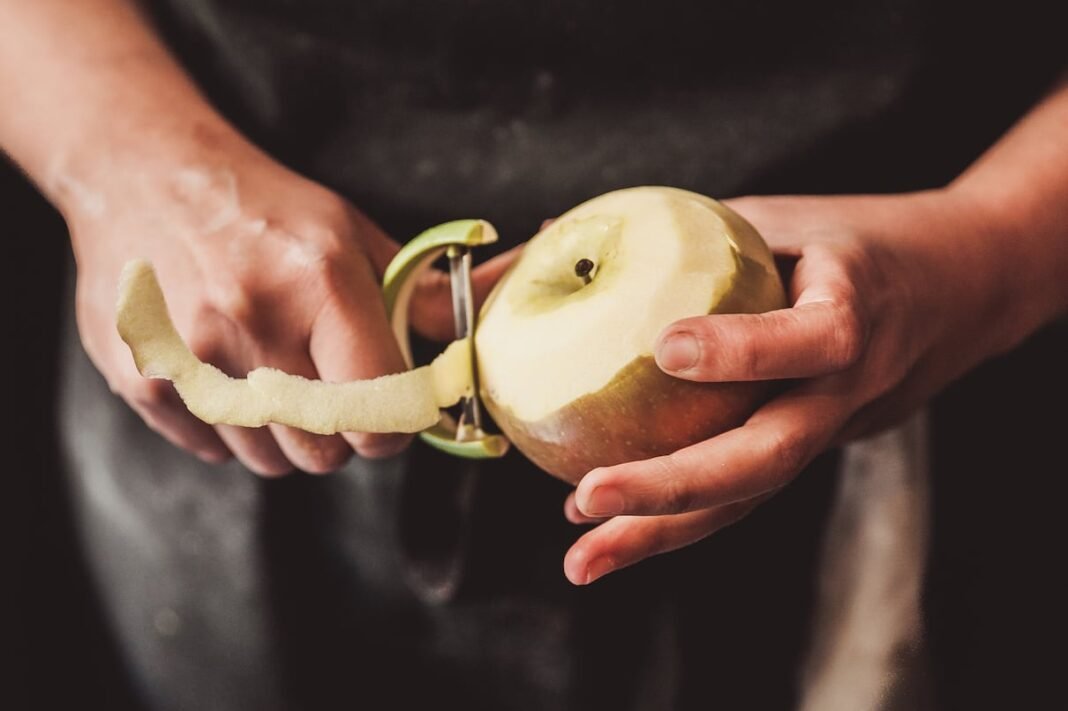Take into consideration the final time you grabbed an apple out of the fridge for a day snack. Are you the kind of one that bites into it straight away? Or do you’re taking it to the sink to soak or scrub it first? Do you take away the peel earlier than slicing it? Maybe you don’t suppose a lot about it.
We’re dwelling in a time when making selections about meals isn’t nearly vitamin, but additionally sustainability, security, and comfort. The choice of whether or not or to not take away the peel of your favourite produce earlier than consuming it has develop into a subject of debate.
Moreover, an organization known as Apeel has created an additional layer of “pores and skin” for produce that helps maintain it contemporary for longer. However does this add to the issues about what’s on our fruits and veggies? Based on social media posts that went viral earlier this yr (and can most likely flow into once more), it does.
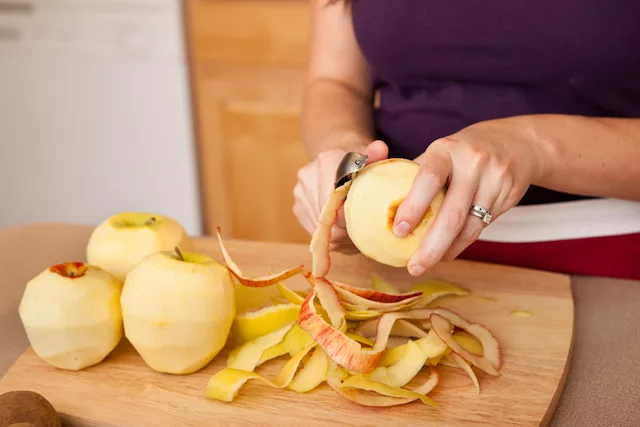
So, what’s the reality? Is Apeel protected? Do you have to strip the protecting layers of nature’s bounty or embrace the pores and skin and all its vitamins (and potential dangers)? We’re diving into the query of whether or not to peel or to not peel, together with the best way to spot Apeel on fruit and veggies and whether or not it’s value worrying about.
What’s Apeel on Fruit?
Apeel Edipeel is a plant-based coating that was created to elongate the shelf lifetime of contemporary produce. It’s meant to maintain moisture in and oxygen out to sluggish the ripening (and rotting) timeline. The corporate claims that it might maintain produce contemporary for twice so long as regular and scale back waste.
The coating relies on cutin, a waxy barrier towards the weather product of fatty acids and naturally exists on fruit and veggies. Apeel — produced from purified monoglycerides and diglycerides — can both be used to spray or dip the plant by which helps it block parts that promote rotting.
Presently, Apeel is just permitted for avocados, limes, mandarins, apples, and cucumbers which are out there in choose shops (like some Goal, Safeway, and Costco places). Produce that’s coated in Apeel bears an oval-shaped, inexperienced and white sticker indicating such.
So, is Apeel Edipeel protected to devour? Properly, should you had been on social media in April of 2023, you’ll have observed viral posts sharing a security knowledge sheet claiming that Apeel was hazardous and will trigger critical harm to your well being. However what folks sharing the submit didn’t understand was that the protection sheet wasn’t for Apeel Edipeel however for an unrelated cleansing product known as Apeel.
The underside line? Apeel Edipeel, the coating used on sure contemporary produce to elongate shelf life, has not been proven to be harmful to your well being. The elements, monoglycerides and diglycerides, fall within the class of Usually Acknowledged as Protected (GRAS) by the Meals and Drug Administration (FDA). As of now, consultants say that Apeel produce doesn’t appear regarding.
Now that we’ve obtained that sorted out, let’s transfer on to a few of the different issues to contemplate in relation to our produce. First, what are the professionals and cons of consuming fruits and veggies with the pores and skin left on?
Execs of Consuming Produce Pores and skin
The aversion to consuming the peels of fruits and veggies typically varieties as a texture problem throughout childhood, however it might proceed into our grownup years out of behavior. Nevertheless, studying to depart the edible pores and skin on sure forms of produce can improve the dietary advantages we get from it.
Katie Schimmelpfenning, RD tells us, “Consuming the pores and skin of produce reminiscent of apples and potatoes not solely boosts the vitamins you get from the meals however the fiber too. Fiber from peels helps to advertise fullness.”
Fiber is a important nutrient for well being that many American adults are missing. Actually, surveys estimate that solely 5% of us are assembly the minimal day by day necessities for fiber — which is round 30 grams.
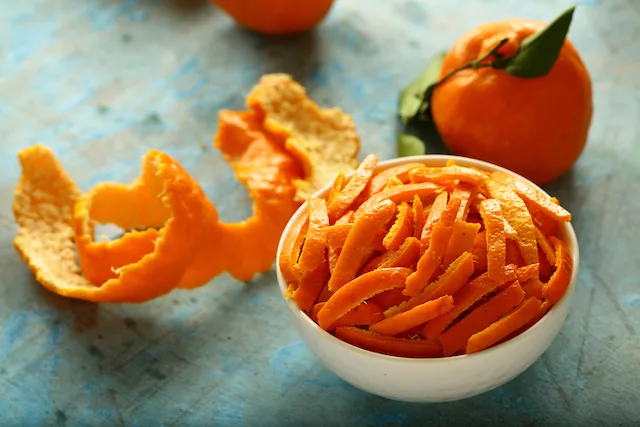

Schimmelpfenning explains that past fiber, produce pores and skin is a wealthy supply of nutritional vitamins, minerals, and antioxidants. She continues, “These may also help to cut back irritation and forestall illnesses reminiscent of most cancers and coronary heart illness.”
Along with the additional dietary good thing about consuming the pores and skin, leaving it on may also help scale back our family meals waste and the general environmental influence of our food regimen.
In any case, a whopping 30-40% of the meals provide in the US leads to the landfill. A few of this meals loss is because of points like spoilage at numerous factors alongside the availability chain, however a lot of additionally it is client and retail waste. Consuming the pores and skin of your produce is one strategy to maintain extra out of the trash.


Cons of Consuming Produce Pores and skin
Whereas there’s little question that produce pores and skin is an efficient supply of vitamins, consuming it doesn’t come with out potential dangers to contemplate.
Wan Na Chun, MPH, RD, CPT tells us that the pores and skin of fruit and veggies may be house to dangerous chemical substances, pesticides, and contaminants. To scale back the chance of consuming them, she says, “It’s advisable to scrub and soak the produce, in addition to selecting natural [varieties].”
Chun explains that the Environmental Working Group (EWG) publishes an annual evaluation known as the “Soiled Dozen™. This can be a checklist of 12 fruit and veggies which are discovered to be most contaminated with pesticides primarily based on the most recent testing knowledge from the US Division of Agriculture and the Meals and Drug Administration.
The 2023 Soiled Dozen checklist contains strawberries, spinach, kale, collard and mustard greens, peaches, pears, nectarines, apples, grapes, bell and scorching peppers, cherries, and blueberries.
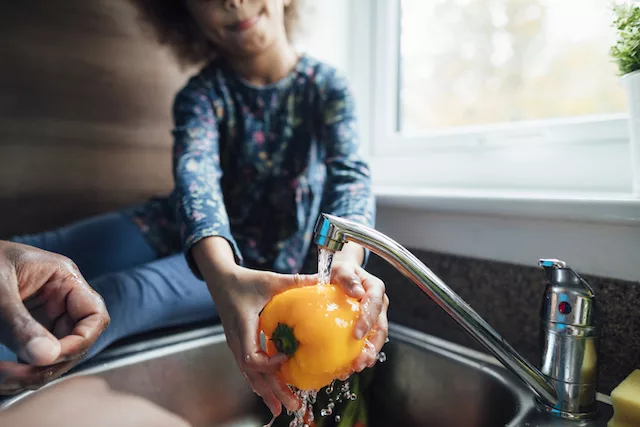

Chun says, “Publicity to dangerous chemical substances, pesticides, and contaminants discovered on the pores and skin of some fruit and veggies can pose potential dangers to human well being together with dermatological, gastrointestinal, neurological, carcinogenic, respiratory, reproductive, and endocrine results.”
The EWG additionally printed what’s known as The Clear 15 checklist, which incorporates the produce examined to comprise the least quantity of pesticides. People who make the minimize usually have a troublesome outer peel or husk that must be eliminated earlier than consuming, due to this fact defending it from contamination.
The most recent checklist contains avocados, candy corn, pineapple, onions, papaya, frozen peas, asparagus, honeydew, kiwi, cabbage, mushrooms, mango, candy potatoes, watermelon, and carrots.
Produce to Peel
Don’t panic — you don’t have to start out peeling each fruit and vegetable you buy. However sure ones might typically be safer to to eat peeled because of their chance of housing extra pesticide residues, or as a result of the feel of their pores and skin may be tough to digest.
Some to contemplate peeling embrace:
- Apples and Pears: These fruits have gentle, permeable, and skinny pores and skin that will make them extra prone to pesticide publicity. Eradicating their peel may also help scale back your consumption of probably dangerous chemical substances. Moreover, the pores and skin on apples and pears could also be more durable to digest for some people.
- Potatoes and Candy Potatoes: Though potatoes are typically low on the contamination danger checklist, they’re tremendous simple to peel and this generally is a easy strategy to scale back your publicity. Candy potato pores and skin can be more durable to chew.
- Cucumbers: The waxy peel of a conventionally grown cucumber might home residues and potential contaminants if it’s not natural. It additionally tends to have a bitter style that some folks don’t take pleasure in.
Produce to Purchase Natural
Peeling the pores and skin from higher-risk produce is prone to take away a few of the dangerous substances that could be current, however not all of them. Moreover, some pesticides are systemic, that means they’re drawn up via the plant’s root system versus being externally utilized. On this case, peeling them doesn’t make an enormous distinction.
In some instances, sure fruit and veggies could also be higher off bought natural versus typical. Natural produce is much less prone to have dangerous chemical substances on their pores and skin due to the agricultural follow requirements which are required to attain natural certification.
Based on the USDA Nationwide Natural Program, “These strategies combine cultural, organic and mechanical practices that foster biking of assets, promote ecological steadiness and preserve biodiversity. Artificial fertilizers, sewage sludge, irradiation, and genetic engineering is probably not used [in order for something to be considered organic].”
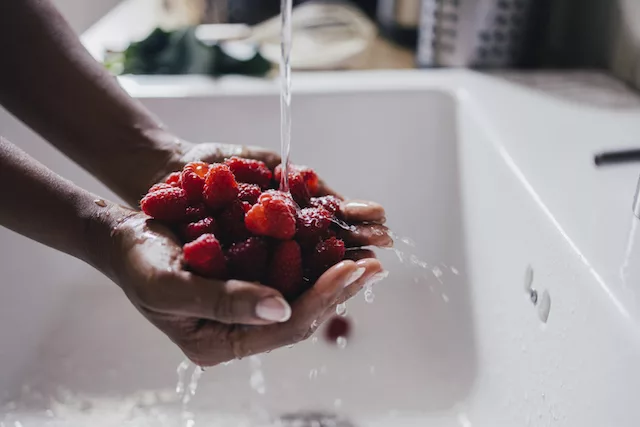

Think about selecting natural variations of:
- Berries: Strawberries and different berries are a few of the greatest sources of vitamin C and antioxidants, which assist defend your cells from oxidative stress and harm. In addition they are inclined to have skinny pores and skin, which makes them extra prone to pesticide contamination after they’ve reached your dinner desk. Plus, have you ever ever tried to peel a berry? I wouldn’t advocate it.
- Leafy Greens: Leafy greens, like lettuce, arugula, spinach, kale, and Swiss chard, are among the many healthiest meals on the planet. They’re stuffed with fiber, antioxidants, nutritional vitamins C, A, and Ok, and folate. These veggies even have a number of texture and floor space, and no peel, making them extra prone to dangle onto dangerous compounds. Think about buying natural to reduce your publicity to pesticide residues in your favourite salad greens.
- Peppers and Tomatoes: Peppers and tomatoes have permeable pores and skin which can be extra prone to enable dangerous chemical substances inside. Peeling these crops wouldn’t solely be messy however can considerably alter their texture, so selecting natural variations could also be a less complicated possibility.
Staying Protected from Dangerous Chemical substances
Whether or not or to not peel your produce or buy natural is a private selection. Typically the dangers don’t outweigh the advantages, and vice versa.
For produce you’re not peeling or shopping for natural, simply make sure to wash them effectively. Consultants advocate working them beneath water. Present mild friction along with your palms to provide with gentle pores and skin. For these with tougher or textured pores and skin, use a produce brush to take away dust and residue.
One 2006 research discovered that the discount in floor contamination by soaking leafy greens in lemon juice or vinegar was not considerably totally different from soaking them in water. Soaking was additionally simpler for smooth-skinned produce versus lettuce and broccoli. The authors concluded that lightly scrubbing produce beneath a stream of cool water is an satisfactory at-home produce cleansing methodology.
A 2017 research in contrast the effectiveness of plain water, an answer of 1 ounce of baking soda with 100 ounces of water, and a Clorox bleach answer in eradicating pesticide residues from apples. The authors declared the baking soda answer the winner, which fully eliminated the pesticides in beneath quarter-hour.
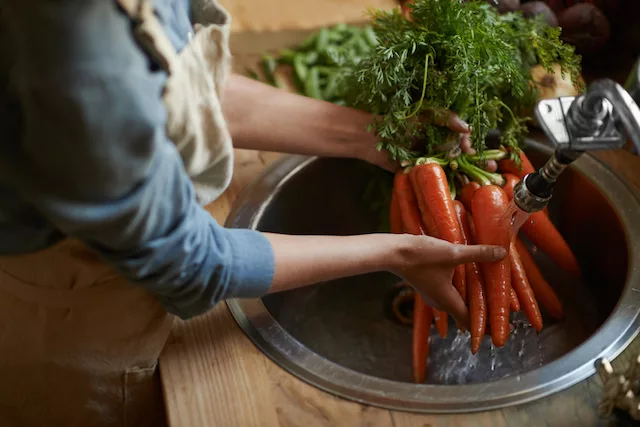

As you discover security in your produce, it’s additionally value supporting sustainable farming practices, that are in place to propel a safer and fewer environmentally harmful meals system as an entire. On the finish of the day, purpose to have a wholesome consciousness concerning the meals you eat. What issues most is that you just’re consuming all kinds of nutritious plant meals repeatedly and your selections replicate your private values.
Chun agrees, saying, “Each natural and conventionally grown produce can comprise pesticides, and neither is inherently safer or more healthy than the opposite. The vital factor is to get loads of servings of fruit and veggies every day, whether or not you select to eat the pores and skin or not.”
The Remaining Apeel (See What We Did There?)
Fruit and veggies present an array of vitamins which are important to our well being. Sadly, most of the fashionable agricultural strategies used to develop them lead to produce that’s contaminated with pesticides. There are additionally different issues to contemplate when selecting produce, like whether or not you need to buy ones that use Apeel.
One possibility to cut back your publicity to probably dangerous compounds is to buy licensed natural produce, although this may get costly and isn’t at all times essential. Another choice is to be sure you’re washing produce effectively and eradicating the peel or pores and skin for a few of the higher-risk varieties.
Make knowledgeable selections in relation to consuming fruit and vegetable pores and skin. The most suitable choice is the one which works in your way of life and aligns along with your targets and preferences.
What have your experiences with peeling produce been like? Have you ever bought Apeel produce? Share different suggestions and recommendation within the feedback, and subscribe to the HUM e-newsletter for extra insights on wholesome consuming and meals security.

